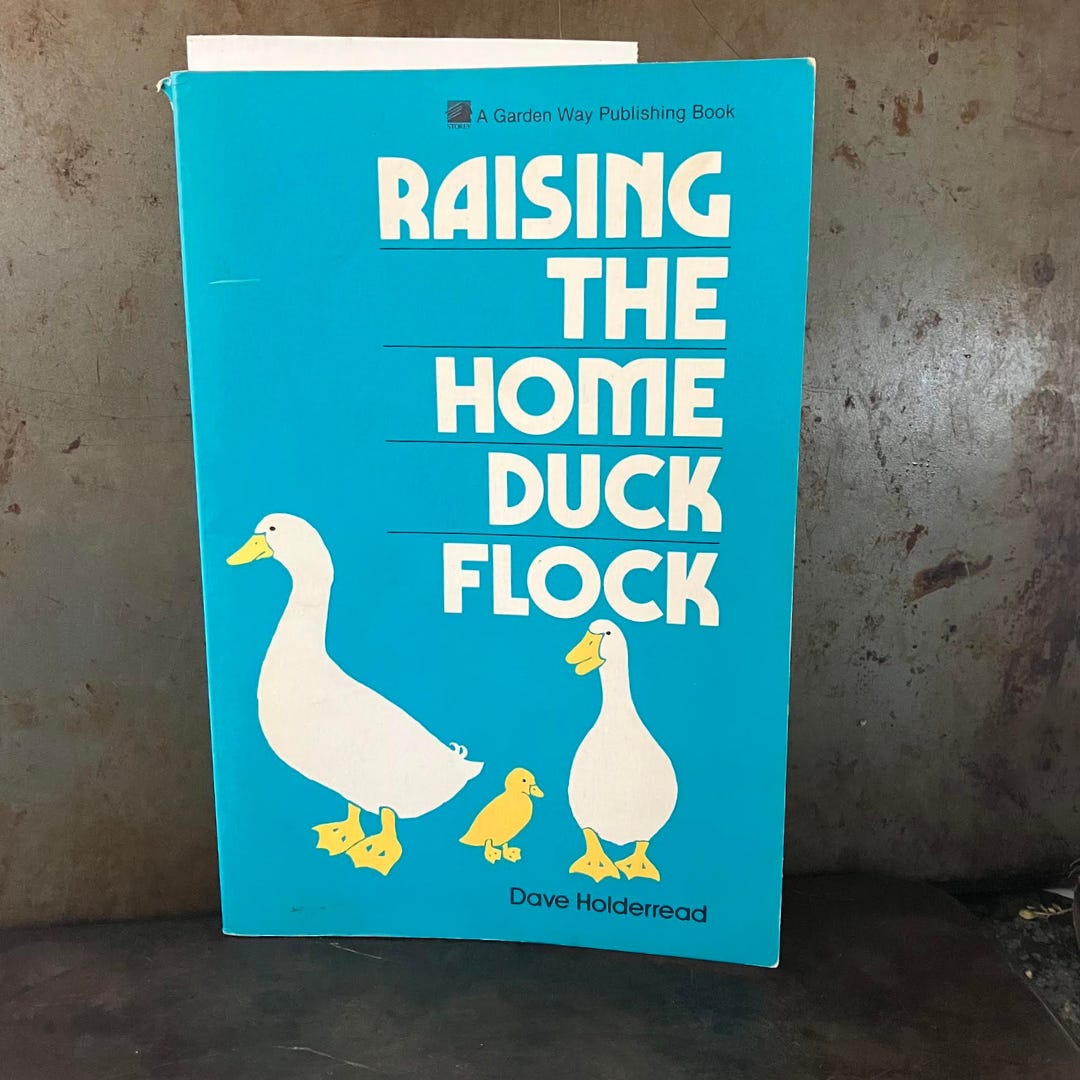THE DUCK BOOK
“As I held it aloft, I said, ‘The thing is, I don’t think he ever had ducks'...."
When I found Raising the Home Duck Flock on Alex’s bookshelf, early in our relationship, I was charmed. It seemed so incongruous. He was studying to be a therapist and mostly read people like Winnicott and Bowlby and Anna Freud. His post-divorce apartment was crowded with books, stereo equipment and camping gear. There was definitely no place for a single duck, let alone a flock.
It wasn’t entirely incongruous, though. During his marriage, he’d had a small farm, where he built a barn and drove a tractor and had cows named Hopi and Butternut. He grew Silver Queen corn and watermelons so sweet, people lined up for them at the farmers market on Saturday mornings. He claimed they called him “King of the Silver Queen.”
We met at a mutual friend’s birthday party in the summer of 2001. The friend and I were both 35. Alex was 58—though he didn’t look it and I wouldn’t learn his age for months—and was going back to school to earn his MSW, his second master’s degree, after a lifetime of being good at many things and not sticking with most of them. After he got the degree, he spent 15 years as a social worker, the kind who took his young clients on nature hikes and carried an array of balls in his car so he could have sessions while playing basketball or catch.
When he was 75, still working, still vibrant and engaged, he began to have memory lapses. He confused a TV remote with a cordless phone. He asked why we were gathered at my brother’s house—on Thanksgiving. One night, sitting in our kitchen, he told me that he knew we were in a relationship, but—gesturing around to the world outside the kitchen, the house—he wasn’t sure about anything else. A few months later he was diagnosed with dementia.
His ability to communicate suffered along with his memory. If I asked whether he was hungry, he might tell a story about throwing snowballs at cars with his best friend in North Conway, New Hampshire, or he might say, “Seventy-three.” I learned to assume that he was hungry, but I missed being able to ask him a question and have him answer.
He died in January, 2022, six weeks after going into the hospital with pneumonia. We held the memorial service in June, on top of his favorite mountain, on what would have been his 79th birthday. I brought props for my eulogy, including Raising the Home Duck Flock, which had survived multiple book purges over the years. As I held it aloft, I said, “The thing is, I don’t think he ever had ducks”—at which point, his ex-wife and two daughters said nearly in unison, “We did have ducks!”
The ducks, it turned out, had been eaten by a raccoon early on. This explained why the bookmark hadn’t progressed beyond page 53. But what struck me was that in the 20 years we were together, for all the times we laughed about the book, Alex never once said he’d had ducks. And I never asked. The book reminds me of everything I never asked that I will now never know. Sometimes I still ask anyway.
—Sue Dickman
Sue Dickman is a writer living in Western Massachusetts. Her work has appeared in The Washington Post, The San Francisco Chronicle, The Christian Science Monitor, The Millions and other publications.




I was deeply moved by your account, seen online on the Washington Post today, about the inner conflict you faced around navigating your beloved partner's dementia. I am part of The Torn Project, a project exploring – and collating advice and inspiration about – the issue of *inner conflict*, where people struggle around which direction in life to take. I would be very very interested in speaking to you confidentially for an hour on Zoom, not for publication or broadcasting, but to add to our research database of people's thoughts and feelings around the inner conflicts they have faced... we are using this not only to inspire others, but also to gain deeper understanding on what inner conflict involves. If you are interested in talking to me please do write to me directly at susan@thetornproject.com or see our short placeholder page on thetornproject.com where you can contact us - scrolling down to the bottom of that page will also let you see a very lovely poem that one of our contributors has written about the experience of being 'torn'. Warm wishes Susan